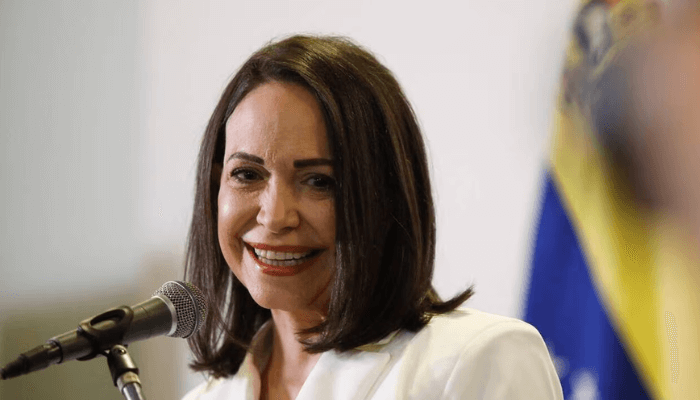María Corina Machado wins 2025 Nobel Peace Prize for her fight for democracy in Venezuela
María Corina Machado wins 2025 Nobel Peace Prize for her fight for democracy in Venezuela
María Corina Machado, the leading figure of Venezuela’s democratic opposition, has been awarded the 2025 Nobel Peace Prize for what the Norwegian Nobel Committee described as her “tireless work promoting democratic rights for the people of Venezuela and her struggle to achieve a just and peaceful transition from dictatorship to democracy.”
The announcement was made on Friday at the Norwegian Nobel Institute in Oslo, recognising Machado’s decades-long campaign to restore democracy in a country where political repression, economic collapse and mass emigration have defined daily life for years.
Read also:László Krasznahorkai wins 2025 Nobel Prize in Literature for his dark, visionary storytelling
Jørgen Watne Frydnes, chair of the Nobel Committee, called Machado “one of the most extraordinary examples of civilian courage in Latin America in recent times.” He praised her decision to remain in Venezuela despite “serious threats against her life,” noting that her determination had “inspired millions.”
“When authoritarians seize power, it is crucial to recognise courageous defenders of freedom who rise and resist,” Frydnes said.
Machado, 58, ran as the main opposition candidate in Venezuela’s 2024 presidential election before being disqualified by Nicolás Maduro’s government. Her disqualification prompted her to back Edmundo González Urrutia, who became the united opposition’s replacement candidate.
Read also: Immune system breakthrough wins 2025 Nobel medicine prize for US, Japan scientists
Official results declared Maduro the winner with 51 percent of the vote — his third term since taking power in 2013 following the death of Hugo Chávez. But the opposition said the election was rigged, claiming González had in fact won with around 70 percent of the vote.
Mass protests erupted across the country, demanding transparency and the publication of results from individual polling stations. The government’s response was swift and brutal, opposition leaders were detained, demonstrators were dispersed with violence, and Machado herself went into hiding.
Observers, including international journalists and election monitors, reported widespread irregularities during the election, from voter intimidation to long, unexplained delays outside polling stations.
In a video shared by her press team and posted by González on social media, Machado appeared visibly stunned upon hearing the news of her Nobel win.
“I’m in shock!” she said in the video.
“We’re shocked with joy,” replied González, speaking from exile. “What is this? I can’t believe it,” Machado repeated, smiling through tears.
Read also: Chemistry Nobel prize 2025 awarded to trio for groundbreaking work on metal-organic frameworks
Despite years of repression, Machado has remained inside Venezuela, occasionally surfacing for brief public appearances. She was briefly detained during a protest ahead of Maduro’s inauguration in January, before being released.
Machado has long been a polarising yet powerful figure in Venezuelan politics. Trained as an industrial engineer, she became known for her uncompromising stance against authoritarianism and corruption. Her political movement has managed to unify disparate factions of the opposition, long seen as fragmented and ineffective.
For many Venezuelans, she represents a rare figure of moral consistency in a political landscape shaped by fear and exhaustion. Her rallies in 2024 drew some of the largest crowds seen in years — a visible sign of public yearning for change.
The Nobel Committee’s decision to honour Machado marks a symbolic moment for Venezuela’s pro-democracy movement. It places her alongside figures such as Aung San Suu Kyi, Malala Yousafzai and Nelson Mandela — individuals recognised for standing up to oppression through peaceful means.
Last year’s Peace Prize went to Nihon Hidankyo, Japan’s confederation of atomic bomb survivors, for its campaign to abolish nuclear weapons.
Although the award is unlikely to ease the political crisis in Venezuela immediately, it serves as an international acknowledgment of the country’s ongoing struggle for freedom, and of the courage of those who continue to fight for it, often at great personal risk.

